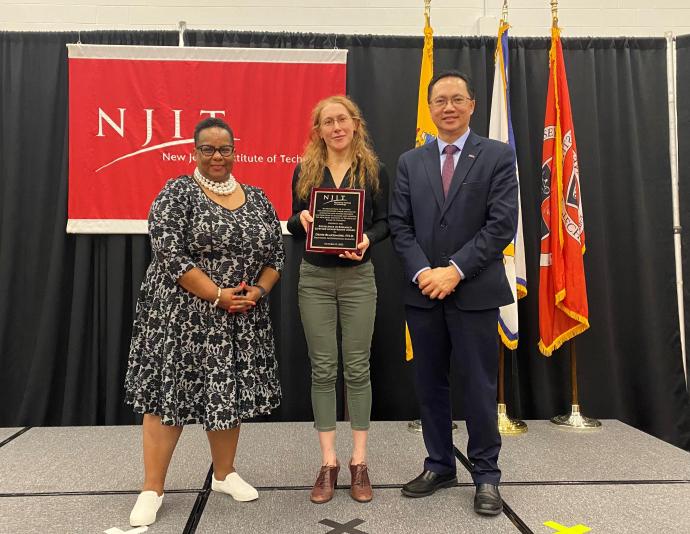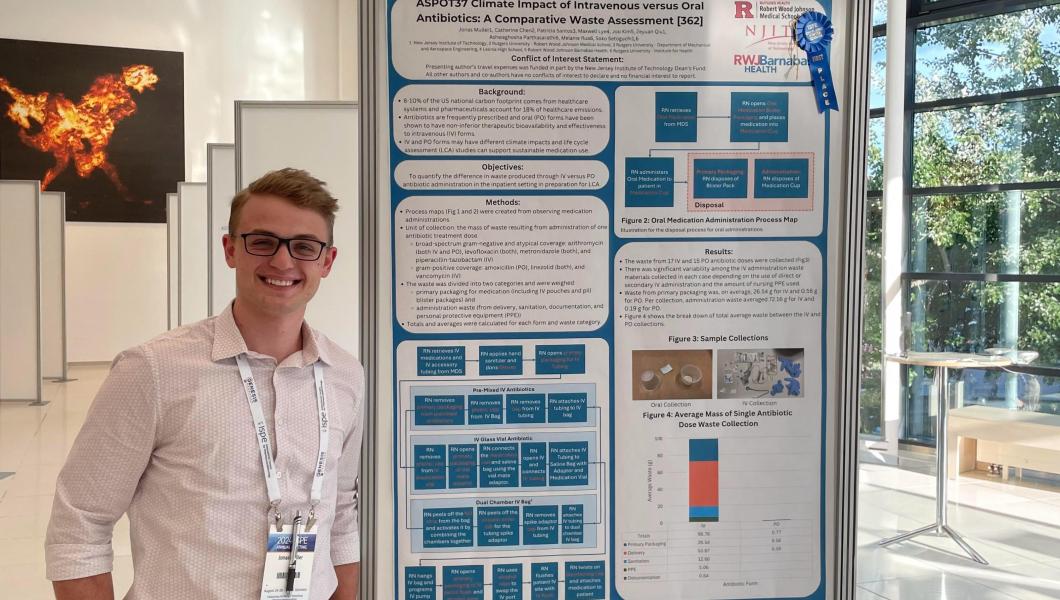An Engineer and a Mathematician Win Honors at NJIT's 2022 Excellence in Research Ceremony

Engineer Michel Boufadel, one of the world’s chief experts on oil spills and a frequent consultant on cleanups, is the winner of the Board of Overseers Excellence in Research Award for 2022. Denis Blackmore, a mathematician who specialized in measuring and modeling changes in a range of dynamic systems, was honored posthumously with the Board of Overseers Excellence in Research Lifetime Achievement Award.
Atam Dhawan, NJIT’s interim provost, called the two awardees “path-breaking researchers” who are esteemed and influential in their respective fields, but also enthusiastic collaborators who figured out early on that the best way to solve complex problems was to join with peers in other disciplines.
Blackmore, he noted, collaborated with engineers to take on challenges in industry, such as particle compaction, to give one example. Boufadel works regularly with computer scientists, statisticians, emergency response specialists, biologists and other engineers on research projects and on prominent scientific committees focused on spills and remediation methods.
A distinguished professor of civil and environmental engineering who focuses on environmental fluid mechanics and hydrology, Boufadel tackles unanswered questions about the mechanics of spills and the effectiveness of remedial methods. He has played a central role in determining new ways to track and measure major oil spills, including releases from the Exxon Valdez, a tanker that ran aground in Prince William Sound, the Deepwater Horizon, a burst well in the Gulf of Mexico, and the Enbridge pipeline in Michigan in 2010, which spewed more than a million gallons in the Kalamazoo River.
In a 600-ft.-long saltwater wave tank on the coast of New Jersey, he and a team of NJIT researchers conducted, for example, the largest-ever simulation of the Deepwater Horizon spill to determine more precisely where hundreds of thousands of gallons of oil dispersed following the drilling rig’s explosion in 2010. His team determined that the use of dispersants had a substantial impact on air quality in the region of the spill by reducing the amount of toxic compounds such as benzene that reached the surface of the ocean, thus protecting emergency workers on the scene from the full brunt of the pollution.
He is currently investigating the transport of dispersed droplets in rivers and their interaction with sediment particles, which leads to the formation of oil particle aggregates, as well as the impact of waves on oil spread.
Boufadel’s interest in fluid mechanics is not restricted to spills. In the early days of the COVID-19 pandemic, he and a team of environmental engineers and modelers studied the virus’s pathways inside supermarkets. He and colleagues at NJIT, Princeton and Duke later developed a model that predicts where the disease will spread from an outbreak, in what patterns and how quickly. That paper was also published in PNAS. More recently Boufadel is developing a “Community Intrinsic Resilience Index” to evaluate a municipality or county’s ability to prepare for, respond to and recover following disruptive events at various levels of severity. It looks at impacts on transportation, energy, health and socio-economics.
In pointing to his influence, NJIT President Teik Lim noted that Boufadel has served on six National Academy of Sciences committees on oil spills, as well as a committee of the Royal Society of Canada, and has so far obtained $13 million in funding from national and international agencies to pursue his research.
Admired as a “renaissance mathematician,” Blackmore taught for a remarkable 50 years at NJIT and was a founding member of the university’s Center for Applied Mathematics and Statistics. He played a significant role in helping the Department of Mathematical Sciences become one of the best-recognized applied mathematics departments in the U.S. He passed away in April of this year.
While his focus was on dynamical systems, he also made significant contributions to a number of other fields, including differential equations, differential geometry and topology, as well as more applied areas, such as fluid dynamics and granular media.
In a paper published in Chemical Engineering Science in 2002, Blackmore and his collaborators provided one of the first clearly formulated, quantitative explanations of the role that vibrations have on size segregation and compaction of granular matter. This type of work with granular materials can be useful in any industry that needs to pack objects into containers, such as the pharmaceutical, food and agricultural industries. The paper was an excellent example of interdisciplinary research between Blackmore and his engineering colleagues, illustrating the importance of mathematical approaches in understanding an applied problem of widespread, real-world significance.
Blackmore authored or co-authored 134 peer-reviewed journal articles and more than 68 refereed conference papers, in addition to writing six books and 10 book chapters.
Colleagues extolled his brilliance and impact on diverse fields, while also speaking with affection about his influential role on campus as a department builder, an oft-appointed “diplomat” on committees affecting university life, a mentor to many and a master of fun. Recently, he served as the president of the Faculty Senate during the COVID-19 pandemic.
He supervised 16 Ph.D. students and over 20 master’s students for their dissertations, and served on over 50 Ph.D. committees. He developed or co-developed over a dozen new courses and played a pivotal role in the development of bachelors, master’s and Ph.D. degree programs in his department.
“But the raw numbers don’t reflect the true picture, because I know Denis was also a dedicated and valued informal mentor to countless other students at all levels, often to be found chatting in his office to students who weren’t even registered for one of his classes. Denis also generously offered many independent study classes, and mentored and supervised research projects for many undergraduate and high school students,” recalled Linda Cummings (above, center), a professor of mathematical sciences and a longtime colleague who accepted Blackmore's award for him.
She added, “As one of his Ph.D. students puts it, “Denis knew how to balance guidance and independence for each student. If a student was stuck on a problem, Denis would work round the clock to help them solve it. On the other hand, if the same student wanted to come up with their own projects or solutions he would give them time and space to figure it out.”


